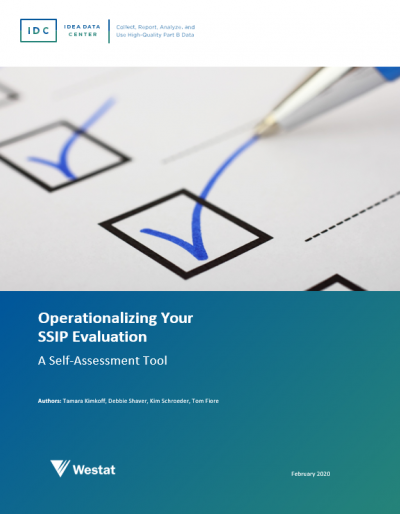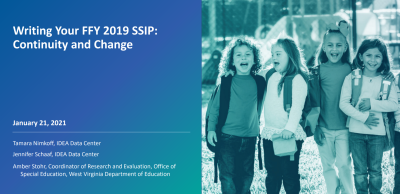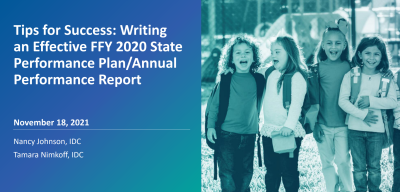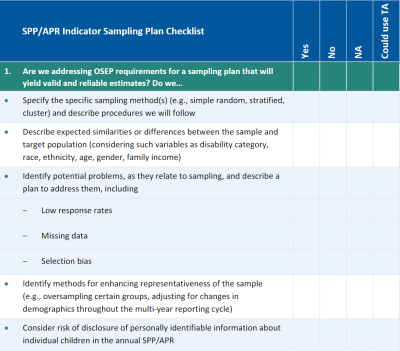Site Search
Results 1 - 7 of 8
-
Blueprint for Success: Using Your Theory of Action to Guide SSIP Implementation and Evaluation
IDC presented Blueprint for Success: Using Your Theory of Action to Guide SSIP Implementation and Evaluation. State Systemic Improvement Plans (SSIPs) are multi-year efforts to improve results for children and youth with disabilities. This webinar emphasized the role of the SSIP theory of action in guiding implementation and evaluation activities throughout the cycle of the SSIP. Participants learned how to review their SSIP activities and theory of action to ensure continued alignment and improve the likelihood of positive results. Presenters shared key IDC resources available to support states in their SSIP evaluation work. Intended audiences include SSIP Coordinators, State Directors of Special Education, and other relevant state staff.
-
Writing Your FFY 2019 SSIP: Continuity and Change
This webinar was designed for those who are new to the SSIP process as well as seasoned SSIP coordinators who would like to learn more about reporting options and requirements for the April 2021 SSIP submission. IDC staff discussed important content to include in the SSIP report, reporting options including a new optional template, and issues to consider when deciding on an optimal format for reporting. A state presenter shared the state’s FFY 2019 SSIP reporting plans, including steps the state will take to ensure that its SSIP report is useful for state decisionmaking and stakeholder engagement.
-
Tips for Success: Writing an Effective FFY 2020 State Performance Plan/Annual Performance Report
IDC staff guided states through writing a comprehensive and accurate FFY 2020 State Performance Plan/Annual Performance Report (SPP/APR), including Indicator 17 (State Systemic Improvement Plan). Presenters highlighted OSEP guidance, shared key points to keep in mind while writing, and provided examples of common writing and reporting challenges and potential solutions. Webinar participants shared their ideas and approaches to writing their reports.
Format: Guides and Briefs
A Guide to SSIP Evaluation PlanningThis guide describes key steps for developing a well-thought-out plan for evaluating an SSIP. The guide provides considerations for how to incorporate each step into an evaluation plan, as well as a series of worksheets that correspond to each step and can be used to facilitate the planning process. The guide, along with its corresponding worksheets, is intended for TA providers to use in partnership with state staff.
Format: Guides and Briefs
Operationalizing Your SSIP Evaluation: A Self-Assessment ToolThe purpose of this tool is to lead those within a state responsible for implementing their SSIP evaluation through the process of operationalizing their SSIP evaluation plan in tandem with implementation efforts. State staff can use this interactive self-assessment to gauge their team’s progress on key components necessary for fully executing their SSIP evaluation plan and to identify action steps needed to realize the greatest benefit from their evaluation efforts.
Format: Toolkits
Data Meeting ToolkitThe Data Meeting Toolkit is a suite of tools that groups can use to guide conversation around data and support data-based decisionmaking. The toolkit provides resources to support success before, during, and after data meetings.
Format: Quick Reference
SPP/APR Indicator Sampling Plan ChecklistStates are allowed to use sampling for collecting data for select Part B State Performance Plan/Annual Performance Report indicators. Sampling can provide an effective means for targeting resources for data collection and improving data quality. However, there are important requirements that states must consider when designing and implementing their sampling plans. States can use this interactive self-assessment tool to determine whether their state’s sampling plan addresses Office of Special Education Programs sampling requirements for best practice and to identify action steps to improve their sampling procedures.








